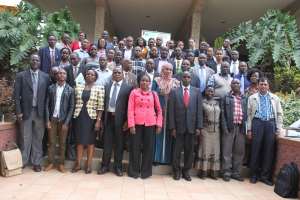
Stakeholders from Civil society organisations, Ministry of Environment, Water and Natural Resources (MEWNR) and members from the private sector have come together and combined their approach to COP21 in Paris at the end of the year.
Among the issues discussed in this mobilization were the Post-Lima context and implications for Africa, climate finance, adaptation and how African countries can plan and submit their INDCS.
The National Dialogue on the Road to Paris and the Post 2015 Development Agenda took place at the Panafric Hotel, Nairobi – organised by the Pan African Climate Justice Alliance and the Kenya Climate Change Working Group.
Dr Charles Mutai from MEWNR kicked off the day’s proceedings by outlining the global context of Climate Finance and that pledges to the Green Climate Fund had now exceeded target of US$10 Billion.
He also announced the government’s establishment of two-year work programme to advance gender balance and promote gender sensitivity in climate policy.
A recurring theme throughout the day was the need to balance climate funding to account for adaptation action as well as mitigation.
Fatuma Hussein from the Kenya Climate Change Secretariat stressed the importance of a united voice on climate change in the lead up to COP21.
He also raised the status of Africa as integral within the G77, particularly with the general president being Ugandan.
With all countries currently in the process of submitting their Intended Nationally Determined Contributions, members of the meeting agreed that Kenya would be judged on the basis of its INDC contribution.
In light of this, the members focused on the INDCs and the importance of a unified position on the process. PACJA has just published a handbook for practitioners on developing their INDCs pledges, which can be accessed here: http://www.pacja.org/index.php/en/media-information-centre/pacja-news/792-indcs-a-handbook-for-practitioners
The panel discussion reflecting on the ADP meeting and exploring expectations for SBSTA/SBI 42 included presentations from representatives of civil society, the private sector and youth organizations. The issues of women and youth engagement were threaded throughout the discussion.
There was strong support for engaging marginalized groups. “Young people are interested in creating green jobs,” said Julius Karanja of the Kenya Climate Youth Network. “Calls for proposals should facilitate youth access to finance practical projects on the ground.”
Sam Ogallah, Programme Manager at PACJA emphasised to the Ministry the need to look beyond Paris: “What if we don’t a protocol? What should we do? We need to have a Plan B and prepare very well to ensure we get a fair deal. We are seizing every space to ensure the civil society voices representing poor and vulnerable are being heard not just nationally but internationally.”
The stakeholder meeting coincided with a second earthquake hitting Nepal and made the issues raised even more pertinent.
“If we’re not well coordinated there’s a risk that things might get missed along the way – unless we speak with one voice it’ll be a bumpy road to Paris. We need global collaboration – I see this landscape here today and I ask that we continue in this spirit – we want make our voice heard committed, focused voices – big and small contributions make a big difference. Let us walk together and let us walk the talk,” concluded Secretary General of PACJA, Mithika Mwenda.




 Supreme court declares payment of wages to spouses of President, Vice President ...
Supreme court declares payment of wages to spouses of President, Vice President ...
 Publish full KPMG report on SML-GRA contract – Bright Simons to Akufo-Addo
Publish full KPMG report on SML-GRA contract – Bright Simons to Akufo-Addo
 Kumasi International Airport to begin full operations by end of June
Kumasi International Airport to begin full operations by end of June
 Election 2024: Our ‘real challenge’ is getting ‘un-bothered’ youth to vote – Abu...
Election 2024: Our ‘real challenge’ is getting ‘un-bothered’ youth to vote – Abu...
 [Full text] Findings and recommendations by KPMG on SML-GRA contract
[Full text] Findings and recommendations by KPMG on SML-GRA contract
 Renegotiate SML contract – Akufo-Addo to GRA, Finance Ministry
Renegotiate SML contract – Akufo-Addo to GRA, Finance Ministry
 J.B Danquah-Adu murder trial: Sexy Dondon to Subpoena Ken Agyapong, Ursula Owusu
J.B Danquah-Adu murder trial: Sexy Dondon to Subpoena Ken Agyapong, Ursula Owusu
 Galamsey: Five Burkinabes jailed 20 years each for mining
Galamsey: Five Burkinabes jailed 20 years each for mining
 'It's no crime' – Abu Sakara defends Alan's exit from NPP
'It's no crime' – Abu Sakara defends Alan's exit from NPP
 'We know all your houses, pay your bills now or we’ll disconnect you; we're all ...
'We know all your houses, pay your bills now or we’ll disconnect you; we're all ...
